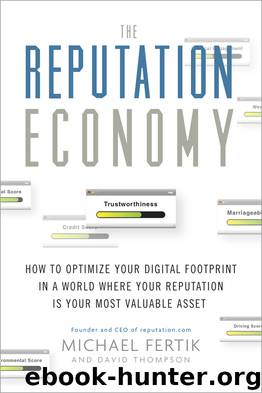The Reputation Economy by Michael Fertik

Author:Michael Fertik [Fertik, Michael]
Language: eng
Format: epub
ISBN: 978-0-385-34760-0
Publisher: Crown Publishing Group
Published: 2015-01-19T16:00:00+00:00
More Than Just a Sheepskin?
There’s no question that signaling is a huge part of the value of a college education. Employers are more likely to hire students with degrees than without, almost universally. They are also more likely to hire (and pay a premium for) students with “brand-name” diplomas from leading four-year colleges than graduates of other programs. Ironically, this is true regardless of the college performance of any particular individual: the bottom student at Harvard is (fairly or unfairly) more likely to be picked for many jobs than the top student at many other schools. (What do you call the last-place graduate of medical school? “Doctor.”) Employers take “college degree” as such a strong signal that students without a college degree (even if they also have a high-quality nontraditional educational background) simply never have the opportunity to prove themselves, because, as we’ve discussed, their résumés get automatically filtered out by computers in the first stages of hiring, while college graduates advance onward to interviews and other evaluations.
And while it’s true that Ivy League and other elite schools spend more on education per student than other schools, this difference in education spending alone doesn’t explain the difference in salaries for graduates of, for example, Harvard, Hanover, and New Hampshire State. This powerful effect of a degree even has a fancy name in academic circles: the “sheepskin effect,” named after the old term for college diplomas, which actually were delivered on sheep hides until high-quality paper became more affordable. (At the University of Notre Dame, undergraduate diplomas were delivered on real sheepskins until the class of 2012, and one religious high school in Virginia still annually delivers its diplomas on the real thing.)
In formal economics literature, the sheepskin effect measures the difference in job and salary prospects between candidates with education histories that are equal except for the fact that one received a degree and the other did not. The difference, as it turns out, is stark. For example, a 2008 Canadian review of prior studies noted that if two candidates went to four years of college but one received a diploma and the other did not (even for reasons outside her control, such as courses being unavailable or degree requirements changing), the one without the degree would receive only 70 percent of the increase in salary one would normally expect from a college degree. Even after controlling for any differences between the groups (noting that college dropouts may have lower grades on average or be different in other ways), the authors of the study were still able to identify substantial differences in earnings potential between the holders of degrees and otherwise identical candidates without degrees. As they put it, “Sheepskin effects remain large even when directly observed skill measures are included in the earnings equation,” and they surmised that the remaining effect was largely due to the signaling effect of college.11 Another study found that, holding all else constant, completing a degree gave more than an 11 percent boost to
Download
This site does not store any files on its server. We only index and link to content provided by other sites. Please contact the content providers to delete copyright contents if any and email us, we'll remove relevant links or contents immediately.
Rich Dad Poor Dad by Robert T. Kiyosaki(6637)
Bad Blood by John Carreyrou(6622)
Principles: Life and Work by Ray Dalio(6453)
Playing to Win_ How Strategy Really Works by A.G. Lafley & Roger L. Martin(6312)
Management Strategies for the Cloud Revolution: How Cloud Computing Is Transforming Business and Why You Can't Afford to Be Left Behind by Charles Babcock(4573)
The Confidence Code by Katty Kay(4264)
Thinking in Bets by Annie Duke(4227)
American Kingpin by Nick Bilton(3888)
Delivering Happiness by Tony Hsieh(3428)
Project Animal Farm: An Accidental Journey into the Secret World of Farming and the Truth About Our Food by Sonia Faruqi(3221)
The Power of Habit by Charles Duhigg(3141)
The Tyranny of Metrics by Jerry Z. Muller(3073)
The Marketing Plan Handbook: Develop Big-Picture Marketing Plans for Pennies on the Dollar by Robert W. Bly(3064)
Brotopia by Emily Chang(3056)
Mastering Bitcoin: Programming the Open Blockchain by Andreas M. Antonopoulos(3046)
I Live in the Future & Here's How It Works by Nick Bilton(2998)
The Content Trap by Bharat Anand(2927)
Building a StoryBrand by Donald Miller(2916)
Applied Empathy by Michael Ventura(2904)
